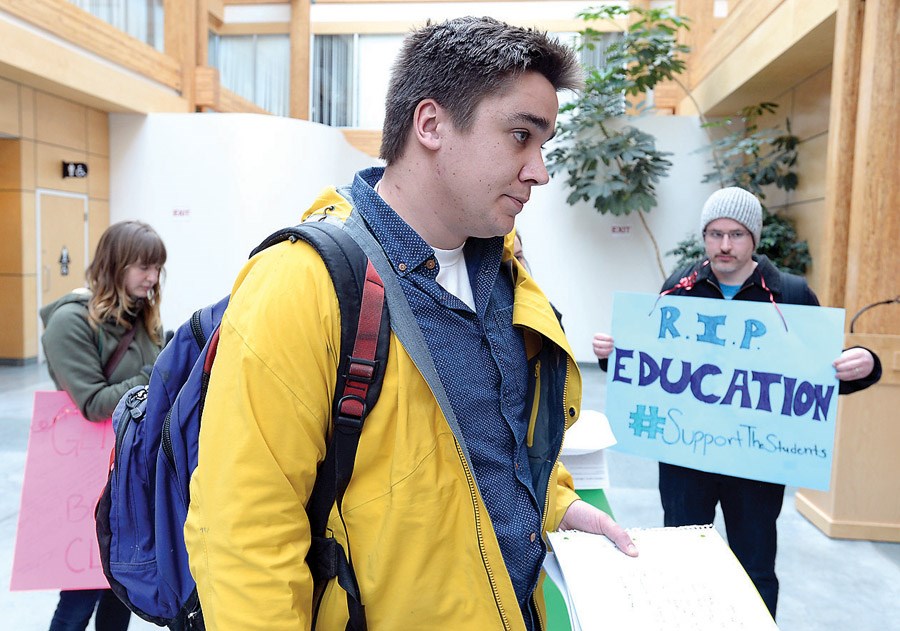A group of University of Northern B.C. students who crossed the picket line Friday morning were greeted with a face-to-face sit-down with the school’s top administrator.
After announcing his intentions during a Thursday afternoon rally, masters student Ian Newcombe was joined by about a dozen students for a trek up University Way Friday morning.
At the top of the hill, the group was met with little resistance from striking members of the faculty association, said Newcombe, before making their way to the administration building where their intention was to occupy the space outside the office of UNBC president Daniel Weeks to ask for compensation for lost school time.
But the students already had Weeks’s attention and were brought into the school’s senate chambers to discuss their ask along with UNBC’s vice president of external relations Rob van Adrichem, vice president of administration Eileen Bray and the dean of science and management Dan Ryan.
Participating students were looking for two options to be made available should the labour dispute not be resolved by March 18: for those who wish to withdraw from the semester to receive a full refund of tuition and fees or for those who choose not to withdraw to be compensated for missed instructional time.
It’s a fair request, said Wendel Schwab, who normally sits as the undergraduate student representative on the UNBC senate.
“I think it would help a lot of students who are in those financial straits and who are facing tough decisions about their career options in the future,” Schwab said.
During the meeting with administration, Schwab raised the issue of a fellow student who received a prestigious internship that begins May 1 and who would have to abandon the end of the semester and all money paid for the term if the strike further delays classes because the opportunity the internship presents is too good to pass up.
Weeks said he was aware many students are in generally similar situations, but couldn’t provide the requested guarantee for student compensation.
“We did not leave here with a resolution so we will be returning on Monday,” Newcombe said.
“That’s not really where we’re at,” said van Adrichem. “What we’ve been consistent and open with is we are committed to do whatever we can to get the semester done on time. That’s what we want to do.”
While appreciative of the fact that thus far students have been showing their support by not crossing the picket line, UNBC Faculty Association president Jacqueline Holler said they recognized that this group of students had their reasons.
“They were on a mission to talk to the president to see if there’s anything they can do to bring their pressure to bear to get a deal,” Holler said. “So I think everyone respected what they were doing.”
The faculty association walked off the job on March 5. The two sides were back at the bargaining table Thursday and are scheduled to return this morning.
During Thursday’s session, the university put forward a new proposal.
Holler said it was “a slightly altered version of what’s been put across the table before.
“We’ve got a lot of work to do still but we are turning that around as quickly as we can and we’re tabling a counterproposal in the morning,” Holler said.
While neither side would elaborate on the specifics of the school’s proposal, van Adrichem said it makes an inroad into addressing the “re-mapping” concept for which the faculty have been advocating. This would take a new approach to compensation and the gap in wages between UNBC professors and those at other post-secondary institutions.
“We’re trying to respond to some of that in a way that still is within the financial envelope that we can afford, but do so in a way that addresses some of their priorities,” van Adrichem said.
This response is in addition to the previously tabled offer of a five year deal, which includes no wage increases the first year, one per cent the second year and 1.5 per cent the final three years.



